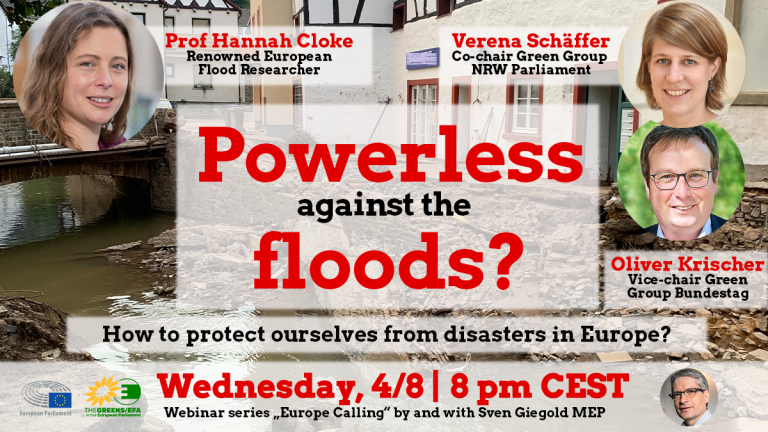Recording:
Dear friends, dear interested,
The consequences of the recent extreme floods in German, Belgium and other parts of Europe are terrible. We must continue to do everything we can to help those affected as quickly as possible. But the climate crisis will lead to more frequent extreme weather in the future. If we do not change anything, we will be hit by worse and worse floods. So how can we better protect ourselves from floods in the future? How can we ensure that the authorities draw the right conclusions from weather warnings and that warning messages reach the population?
In the future, heavy rain will put more and more strain on our rivers which are too restricted in their natural course. But rivers that are as close to their natural course as possible reduce the dangers posed by climate change and flooding, because wide rivers, streams and floodplains offer space to hold more water. In Europe, we already agreed more than 20 years ago with the EU’s Water Framework Directive to restore our rivers to a near-natural state by 2015. However, many rivers and streams in Europe, including in Germany, are still in poor condition, often with catastrophic consequences for humans and nature. In the state of North Rhine-Westphalia, the conservative/liberal coalition government under Minister-President and Chancellor candidate Armin Laschet has even gone into reverse gear in the renaturation of rivers.
Europe invested in an early warning system years ago. Days before the first floods occurred, German authorities were warned of the floods. But these warnings did not always reach the citizens. We want to discuss with Professor Hannah Cloke, Europe’s leading flood researcher, whether and how a better protection of the population would have been possible. Professor Cloke helped set up the European early warning system that was used to predict the recent floods in Germany and the surrounding countries.
Verena Schäffer, as chairwoman and spokeswoman on home affairs of the Green Party in the North Rhine-Westphalia state parliament, called for changes in disaster control long before the flood disaster and will present key points on this.
Oliver Krischer, as the responsible member of the Bundestag, deputy leader of the Bundestag parliamentary group, local MP and nature conservationist, knows the situation on the affected rivers very well. He will use local examples to show how practised nature conservation has already prevented worse and how renaturation can contribute to flood protection in the future.
As an MEP from North Rhine-Westphalia, Sven Giegold systematically deals with the enforcement of EU environmental law in the member states. In the case of the Water Framework Directive, he urged the EU Commission to open infringement proceedings long before the disaster.
Discussing with:
- Professor Hannah Cloke, Professor of Hydrology at the University of Reading, UK.
- Verena Schäffer, Chairwoman of the Bündnis 90/Die Grünen parliamentary group in the North Rhine-Westphalia state parliament.
- Oliver Krischer, Member of the Bundestag from Aachen, Deputy Chairman of the Bündnis 90/Die Grünen parliamentary group
- Sven Giegold, spokesperson for the members of Bündnis90/Die Grünen in the European Parliament.
Date: Wednesday, 4 August, 20:00 – 21:30 hrs CEST
Languages: German and English with simultaneous translation
I look forward to an exciting webinar with you and yours. Please share this invitation with other interested parties.
With green European greetings
Sven Giegold
—
P.S.: Urgent Petition: “Save the European Green Deal”. The centrepiece of Europe’s push to meet the Paris Climate Goals is threatened to fail. EU Member States block every step for more ambitious climate protection. But there is still the chance to #SaveTheGreenDeal. Help us bei signing and sharing this petition with others: www.change.org/save-the-eu-green-deal

